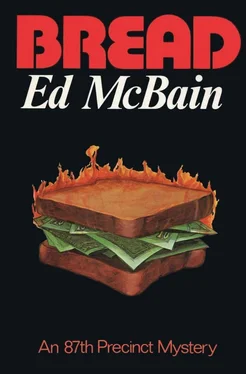“The checkbook is in the top drawer of the filing cabinet on your left,” Grimm said.
Carella opened the file drawer and took out the company checkbook. “July when, did you say?”
“I’m not sure of the exact date.”
Carella had already opened the checkbook and was leafing through the stubs. “Is this it,” he asked. “Six thousand marks made payable to Bachmann Speditionsfirma on July twenty-fourth?”
“Yes, that’s the check.”
“He sure got it fast enough,” Carella said.
“What do you mean?” Grimm said.
“You sent the check on July twenty-fourth. He acknowledges receipt of it in his letter of July twenty-sixth.”
“That’s not unusual,” Grimm said. “The mails between here and Europe are very fast.”
“Are you saying it normally takes only two days for a letter to get from here to Germany?”
“Two days, three days,” Grimm said, and shrugged.
“I thought it was more like five days, six days.”
“Well, I don’t keep track of how long it takes a letter to get there. Sometimes it’s faster, sometimes it’s slower.”
“This time it was faster,” Carella said.
“That’s what it looks like. Unless Bachmann made a mistake in dating his letter. That’s possible, too. These Germans pride themselves on their efficiency, but sometimes they make incredibly stupid mistakes.”
“Like mistakenly dating a letter acknowledging a check, right?”
“You’d be surprised at the mistakes they make,” Grimm said.
Carella said nothing. He turned back to the ledger and the file of correspondence. The next sheaf consisted of carbons of Grimm’s letters to the Allied Insurance Company of America and originals of their letters to him. He had apparently begun doing business with them in June, when he had requested a schedule of rates for insuring 200,000 carved wooden animals, worth half a million dollars, while they were awaiting shipment from his warehouse. Allied had written back to ask for verification of the value of the stock, which he had supplied by sending them Xerox copies of the orders he had on hand. They had then informed him that $500,000 was a rather large risk for one company to take, and that they would be willing to share the risk with Mutual Assurance of Connecticut if Grimm was amenable to this arrangement. There then followed several letters in a similar vein between Grimm and Mutual Assurance, and the whole thing was finally settled by the end of June, with Grimm getting his insurance shortly before the second shipment arrived from Germany. There was no record in the files of Grimm having insured the first shipment. It almost seemed he was expecting a fire the second time around.
“I notice you didn’t insure that first shipment,” Carella said. “The one in January.”
“Couldn’t afford it,” Grimm said. “I had to take my chances.”
“Lucky you insured the second batch,” Carella said dryly.
“Yeah,” Grimm said. “If they pay me. If they don’t, I’m not so sure how lucky I was.”
“Oh, they’ll pay you sooner or later,” Carella said. He closed the ledger and began copying the addresses, telephone numbers, cable addresses, and Telex numbers of both German firms into his notebook.
“Later isn’t soon enough,” Grimm said.
“Well,” Carella said, and shrugged.
“What’ll it take?” Grimm asked suddenly.
“What’ll what take?”
“To get a clean bill of health from you.”
“I’m not sure my word alone would convince your insurers that...”
“But it would help, wouldn’t it?”
“Maybe, maybe not. What would really help is if we caught the arsonist. And the man who killed Frank Reardon. Assuming they’re one and the same, which they might not be.”
“I think if you went to them and told them I had nothing to do with the fire, they’d release the money,” Grimm said. He was standing just directly to the left of where Carella sat now, looking down at him intently. “Will you do it?”
“No,” Carella said. “I don’t know who burned down your warehouse, Mr. Grimm. Not yet, I don’t.”
“How much?” Grimm said.
“What?”
“I said how much .”
The office went still.
“I’ll pretend I didn’t hear that,” Carella said.
“I meant how much time ,” Grimm said quickly. “How much time will you need to...?”
“I’m sure you did,” Carella said. He rose, put on his jacket, and went to the door. “If that canceled check shows up, give me a ring,” he said, and left the office. He had not mentioned Grimm’s police record, and Grimm had not volunteered the information. But then again, if everybody was always totally honest with everybody else, Diogenes wouldn’t have had a job, either.
Meanwhile, back at the scene of the crime, Hawes was going through the building at 2914 Landis Avenue with a detective from the 83rd Squad, in which precinct Diamondback happened to be located. The detective was named Oliver Weeks. He was affectionately called Big Ollie by his colleagues on the Eight-Three. (He was not so affectionately called Fat Ollie by various despicable types he had busted over the years.) Big/Fat Ollie was both fat and big. He also sweated a lot. And he smelled. Hawes considered him a pig.
“Looks like he was beat to death, don’t it to you?” Ollie asked.
“Yeah,” Hawes said.
They were climbing the steps to the first floor of the building, where the offices of Arthur Kendall, Attorney at Law, were located. Ollie was just ahead of Hawes, puffing up the stairs, a powerful aroma wafting back down the stairwell.
“Not with fists, though,” Ollie said, panting.
“No,” Hawes said.
“Sawed-off stickball bat,” Ollie said. “Or maybe a hammer.”
“Medical examiner’ll tell us,” Hawes said, and took out his handkerchief and blew his nose.
“You getting a cold there?” Ollie asked.
“No,” Hawes said.
“Summer colds are the worst kind,” Ollie said. “You know this guy Kendall?”
“No,” Hawes said.
“He’s a jig lawyer, represents half the punks who get in trouble around here.”
“Who represents the other half?” Hawes asked.
“Huh?” Ollie said, and opened the door to Kendall’s office.
Kendall’s secretary looked up from her desk in surprise. She was perhaps twenty-three years old, a good-looking black girl wearing an Afro cut, a pale blue jumper over a white blouse, her legs bare, her pastel-blue pumps off her feet and resting to the side of her swivel chair. Her surprise seemed genuine enough, but Hawes wondered how she could possibly have missed all the excitement downstairs — a dead man lying on the floor of the lobby, radio motor patrol cars at the curb, the police photographer taking pictures, the assistant medical examiner bustling about, the ambulance waiting to carry the body to the morgue.
“Yes?” she said, and bent over to put on her shoes.
“Detective Weeks,” Ollie said, “83rd Squad.”
“Yes?” the girl said.
“What’s your name?” Ollie asked.
“Susan Coleridge.”
“We got a dead man downstairs,” Ollie said.
“Yes, I know,” Susan answered.
“Hear anything happening down there?” Ollie asked.
“No.”
“How come? It’s just down one flight of steps there.”
“I was typing,” Susan said. “And the radio was on.”
“It ain’t on now,” Ollie said.
“I turned it off when I heard the police cars. I went out in the hall to see what was happening. That’s when I realized Charlie’d been killed.”
“Oh, you knew him?”
“Yes. He worked upstairs.”
Читать дальше









